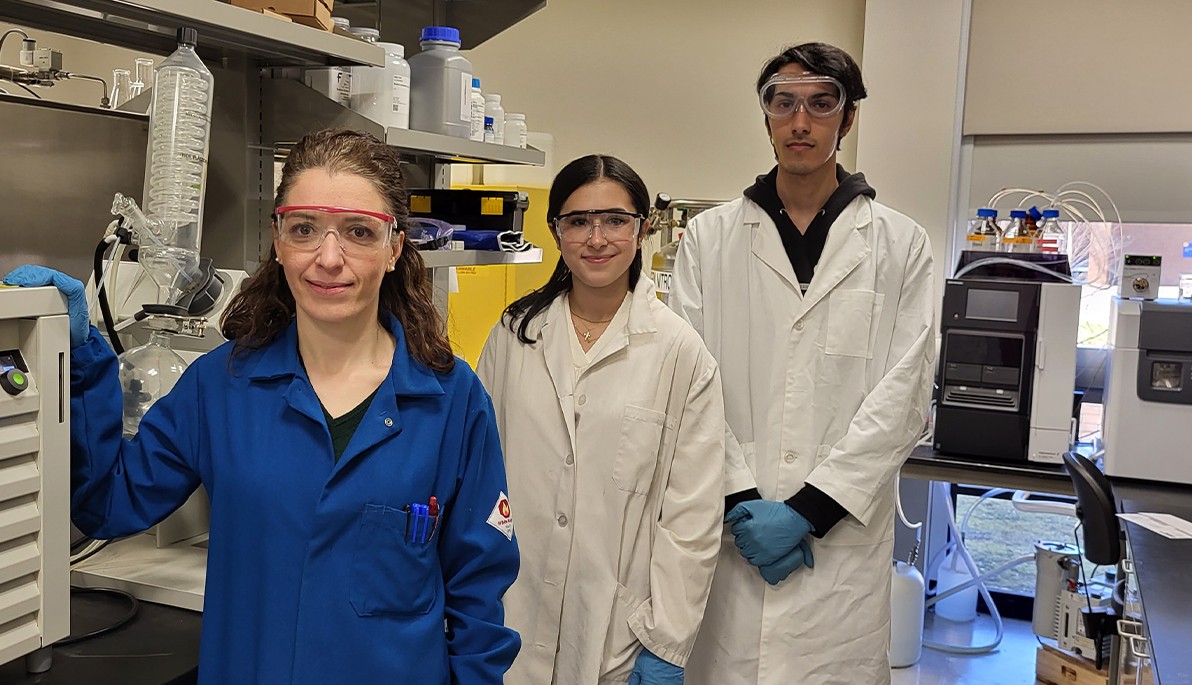News
NIH-Funded Research Could Lead to New Drug Treatments for Alzheimer’s Disease
April 12, 2023
Pictured from left: Assistant Professor Jole Fiorito, Ph.D.; Annette Pietraru, a B.S., life sciences/D.O., osteopathic medicine student; and biology major Syed Hussain
Assistant Professor of Biological and Chemical Sciences Jole Fiorito, Ph.D., who specializes in medicinal chemistry, has secured a three-year grant from the National Institutes of Health (NIH) National Institute of Neurological Disorders and Stroke. The $438,583 grant will support research into early-stage drug development to treat Alzheimer’s disease. The research team consists of Fiorito as principal investigator; New York Tech faculty co-investigators Michael Hadjiargyrou, Ph.D., distinguished professor and chair of biological and chemical sciences; and Raddy Ramos, Ph.D., associate professor of biomedical sciences; as well as Ottavio Arancio, M.D., Ph.D., a professor of pathology, cell biology, and medicine at Columbia University.
A neurodegenerative disease, Alzheimer’s disease has an increasing health and financial impact on society as there are no pharmacologic interventions that effectively counteract it. Limited treatment options are available to target mild to moderate Alzheimer’s symptoms, such as memory loss, but little is available to modify the disease’s progression. Fiorito’s early-stage work seeks to develop a compound that inhibits two specific enzymes, thus helping improve learning and memory processes.
Using an innovative drug design approach, Fiorito’s project will identify new small molecules with a dual mechanism of action that modulate critical biological pathways underlying synaptic plasticity in Alzheimer’s disease. Plasticity is the brain’s ability to change and adapt to new information; synaptic plasticity is a change that occurs at the junctions (synapses) between neurons that allow them to communicate.
In previous research at Columbia University, before she joined New York Tech in 2017, Fiorito helped develop molecules to improve the signaling pathway that is found to be impaired in Alzheimer’s patients. Specifically, she found that when the molecule cGMP is increased, so are learning and memory. Fiorito is targeting the enzyme that degrades cGMP in patients with Alzheimer’s disease using a PDE5 inhibitor she designed in her lab. PDE5 inhibitors are commonly used in drugs for pulmonary hypertension, among other uses. Fiorito is now exploring the PDE5 inhibitor in combination with another enzyme shown to improve learning and memory, histone acetyltransferase (HAT). “My research goal is to develop molecules that can act on two different targets that impact the disease at the same time in order to have a greater effect than each on their own,” she explained.
Five New York Tech undergraduate students will participate in the research project and be trained and supervised by all investigators.
The ideal intended outcome is to develop a single-drug treatment to stop the disease’s progression while reducing the side effects that taking multiple drugs can generate. “Results from this study will advance our knowledge on the synthetic feasibility and therapeutic potential of these small molecules and will open avenues of opportunity for the discovery of a novel therapeutic candidate,” she said.
Research reported in this publication was supported by the National Institute of Neurological Disorders and Stroke of the National Institutes of Health under Award Number R15NS132053. The content is solely the responsibility of the authors and does not necessarily represent the official views of the National Institutes of Health.



_Thumb.jpg)

